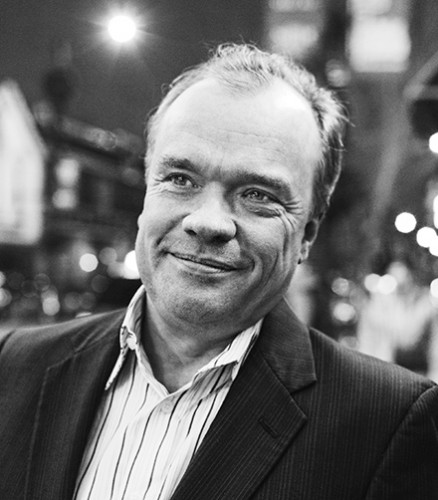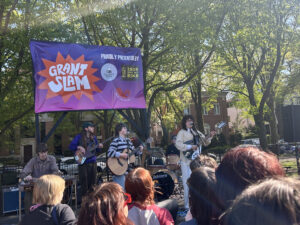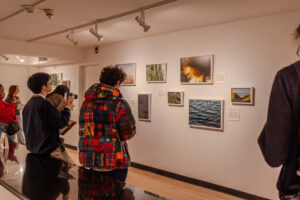
Chris Jones, a native of Manchester, England, has been a theater critic for the Chicago Tribune for 15 years and has reviewed thousands of productions locally, in addition to critiquing performances in New York and other cities with rich theater traditions.
Tucked away in a window seat at Argo Tea, he talks about his experience as a critic and his views on the Chicago theater market as a whole.
Q: How did you develop your interest for theater?
A: I became interested in theater as a teenager mostly by going to see it. I would go on dates to the theater in the 70s and 80s in Manchester and I became entranced with certain local theaters. I would go and see their shows frequently and that was how I got into it.
Q: What made you transition from teaching theater for 10 years to critiquing it?
A: I really had this twin interest in media and theater. I went to school as an undergrad and studied drama and acted and directed quite a bit, but I was always, from the beginning, interested in journalism.
Q: How would you describe the theater market here in Chicago?
A: The Chicago theater market is divided into three sections. The bulk of what we see is nonprofit companies that are resident in Chicago. They are the result of frequent collaborations between ensembles or artists who have been doing it for quite some time. Another section is ensembles and actors in their early 20’s who have graduated together from the same school who want to get a start. If they’re really talented that can be exciting. Then there are the road shows from New York, which are part of Broadway in Chicago and play downtown. Those are, overall, in the ecosystem of Chicago theater, not that important. However, there is an interest in pre-Broadway tryouts here, which allows us to see the work of really great artists at the peak of their talent that are part of that New York scene.
Q: Considering both straight and musical theater, how do Chicago productions compare to NYC?
A: First thing is that Chicago has a great theater scene. Which sounds really cliché, but it’s true. I’m in a position of constantly comparing it to New York because I’m there a lot. The difference is that New York is the center of the theater business and it has this thing called Broadway on it where you sometimes see the very highest level of attainment in theater. Chicago is often more early career people than you find elsewhere. So, I spend a lot of my time seeing people who I think in another 20 years will be really great or on Broadway. The other difference is that spatially, with some exceptions, we’re seeing theater in Chicago in more intimate settings than it is in New York. Which changes things very, very drastically.
Q: What is your thought process during a performance?
A: It varies based on how long I have to write the review; for example, if I’m writing on an overnight deadline, which I sometimes do, I almost have to write it in my head during the show. So on those evenings I’m very focused on “What is my lead? How am I going to come at this?” If it’s something I’ve got a couple of days to think about, which is most of the time, then I try to sort of just respond to the show and not obsess over it. Sometimes the lede to the review will come to me during the show so I’ll write it down while it’s in in my head. A lot depends too, on how familiar I am with the material. If I’m reviewing comedy or sketches, say at Second City, I worry about forgetting that. Any show where there’s an enormous amount of disparate material, I try to write down everything that’s going on. I take my heaviest notes at places like that.
Q: What qualities of a performance draw you in the most?
A: Is it believable? Is it true? That’s what I first ask myself. Could what I’m seeing happen in life? Do I feel that everything is being honest? Theater seems to work better when there is a very consistent world; in other words, that the rules of the show don’t keep changing. I’m also always interested in risk. Is the show taking a risk? Does it feel like people on a tightrope? If it possesses these qualities, I’m always drawn in.
Q: What takes you out?
A: I’m resistant to anything overblown. To some degree that’s an issue, particularly in a very small space. There’s also the issue of how well the actors are cast. One of the downsides of ensemble theater is that people get to do roles they’re not always right for. That happens quite a lot.
Q: What is your favorite genre of performance art to witness?
A: I like all of them, I really do. Whatever it is I want it to be good. I enjoy musicals, comedy, straight drama; I don’t have a preference other than high quality.
Q: How do you keep art in your life beyond critiquing it?
A: To some degree, when you do this job, you cannot be part of a world that you yourself are reviewing the way that I do at the big paper in town. So, when I took this job I had to give up certain things. There are times when anyone who is watching art all the time thinks to themselves ‘well, I could do that.’ Maybe I could, but it just wouldn’t be appropriate. Regardless of what your beat is, as a journalist, you have to step outside of it, and that is a sacrifice in life. You have to be okay with that, I suppose.
In addition to that, a critic’s relationship with anyone you cover is very complicated. There’s a certain unease or distance that comes with the territory. But, I do teach a theater class at DePaul and that allows me to have a warmer relationship with people and I do cherish that. I can be myself a bit more.
Q: What advice do you have for young artists looking to enter this market
A: The great thing about this market is that if you show up here, get it together, get a show up, and it’s good, I think a paper like mine, which would ignore you in every other city in America, in this city, would make an effort to show up. I think that’s just the history and the tradition of the Chicago theater. The number one piece of advice is to get your show up and do what it is you’ve got to do. Secondly, if you come in here with something fresh and something new and highly original, then I think your chances of being noticed are much greater.
Chris lives with his wife and two sons in Evanston, Illinois and enjoys teaching a How to Critique Theatre class at DePaul University. As well as having his reviews published weekly, he can be seen live on CBS-2 Chicago in a segment called On Stage with Chris Jones.
















Be First to Comment